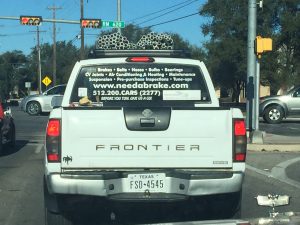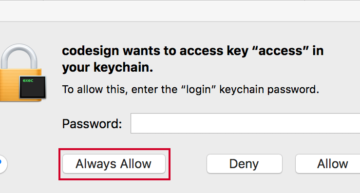Does your business’ domain name pass the radio test?
Quick Summary of Contents
Can your potential customers remember your domain without misspelling it while hearing it via a television or radio ad?
If you’ve never considered the thought of whether or not your business’ domain passes the radio test, then today’s post will open you up to a world that is sure to change your perspective on the importance of using domain names passing the radio test.
Most business owners don’t know whether to consider the radio test when selecting a domain name.
In fact, most business owners consider their business name and domain based on emotional ties.
Others often consider a domain name based on registration availability.
There are a multitude of ways that domain names are conceived.
However, the radio test is rarely, if ever, applied to most domain name selections.
Now you may be thinking, “How does a domain name passing a radio test impact my business? Well, I’m glad you asked.
What is a domain name radio test?
In short, a domain name passing a radio test is more about linguistics and phonetics than it truly is about being on the radio.
Simply put, the domain test is given the name “radio test” because a person must be able to spell your domain without seeing it spelled and encountering number and word collisions or sound alike.
Such confusion leads to traffic leakage and lost sales, something our businesses can’t afford to happen.
So, below is my list of 5 tests to ensure that your domain passes the radio test with flying colors.
Watch for number and word collisions.
A few number and word collisions can happen when you include certain words and numbers in your business domain. For example, consider the following:
- for, four, or 4
- two, to, too, tew or 2
- won, one, or 1
- eight, ate, or 8
In most cases, the recommended approach is to not consider names with numbers and word uses/occurrences.
If you must, then it’s always best to purchase alternative spellings.
For example, purchase Love1.com and LoveOne.com in addition to LoveWon.com.
Also, I encountered them while at the dentist with my boys.
To help occupy the minds of our little people, they have a television with various cartoons and movies playing.
The video of choice was Thomas The Train, as seen in the image below.
Notice the video was created using AVS4You.com.
It appears they offer AVS Audio, Video, and Image editing software.
Of course, I checked, and AVSForYou.com was registered but not developed.
At the time of this writing, AVSFourYou.com is still available via hand registration.
In my opinion, one should defensively register alternate spellings of your chosen domain if and when applicable.
Omit dashes/hyphens and underscores.
When and where possible, do not include special characters such as dashes/hyphens and underscores in domain names. Seriously, say the following domains out loud:
- GetMyBusinessMoreCustomers.com instead of Get-My-Business-More-Customers.com
- IncreaseWebTraffic.com instead of Increase_Web_Traffic.com
Think twice about abbreviations, slang, acronyms, and weird spellings.
A few weeks ago, I received an email from George Anderson seeking FREE publicity for a company named Coverr.com.
Unfortunately, Coverr.com qualifies as a domain name that epically fails the radio test due to adding an additional consonant to the word “cover.”
If I hear a television or radio ad using this domain or simply close my eyes and say it out loud, then I’m thinking of the exact word “cover” itself and not cover plus an “r.”
The same can be said for the City of Austin’s service to display water usage metrics: DropCountr. I would type the “e” without a second thought.

Below are other abbreviations to not use when not owning the fully spelled-out domain:
- Using “apts” instead of “apartments”
- Using “st” instead of “street”
- Using “streetz” instead of “streets”
- Using “f8te” instead of “fate”
- Using “xchange” instead of “exchange”
- Using “u” instead of “you”
- Using “ur” instead of “your”
- Using “co” instead of “company”
- Using “mgr” instead of “manager”
- Using “mgmt” instead of “management”
And if you must use abbreviations, slang, acronyms, and weird spellings, then I recommend buying ALL alternative spellings that a potential customer might use as defensive domain registrations.
Going hack crazy with non-.com extensions.
Often, business owners get clever altogether to create a domain hack.
Often domain hacks come in many forms. A few hacks are .com domains, while most use a non-.com extension, also known as top-level domains (TLDs).
The most common domain hack extensions used are .in, .ly, .co, .io, .me, .us, and .la.
For example, think of bit.ly or del.icio.us when they first launched their companies.
The .ly and .us domain extensions were a fraction of the cost it would have been to purchase the .com versions.
From a financial perspective, purchasing an expensive .com domain may not have been warranted in their humble beginnings until the business concept of both visions proved to be lucrative or profitable.
Nevertheless, many more domains are hacked out there, including personal domains.
For example, I almost purchased alv.in only because I couldn’t purchase alvin.com after many unsuccessful attempts.
I wanted to make such a purchase to shorten my current domain, alvinbrown.com.
And yes, I did consider the last name Brown.
I didn’t waste any time trying to secure such a common last name and color.
Let’s just say it’s worth millions to someone that’s not me.
Be mindful of similar words.
Last but not least, I want to bring to your attention something I encountered a few weeks back while driving to work and then to get a trim at the barbershop.
It’s a great lesson about using similar or phonetically pronounced words.
As I approached the 620 / Anderson Mill Road traffic light, I noticed a pickup truck with a domain on the back of its windshield: NeedABrake.com.
As up can see in the image below, the domain had many keywords surrounding the domain itself on the back windshield of this little pickup truck.

Of course, I didn’t think much of the domain name at first glance.
Truth be told, I thought it was a good phrase until I closed my eyes, as I normally do, and said the domain name out loud.
It was then my mind visualized the word “break” instead of “brake.”
The phrase itself made me think of NeedABreak.com instead of NeedABrake.com.
I actually thought of a Mother’s Day Out program when saying it out loud with my eyes closed.
To use NeedABrake.com in a tv or radio ad, this business owner would have to own NeedABreak.com to ensure all misspellings are captured and redirected to NeedABrake.com.
Not too long after seeing this pickup truck, give or take a few hours, I was heading to Pflugerville for a haircut.
While traveling the 45 toll road heading east, I spotted the perfect domain that passes the radio test via a billboard.

The billboard ad is in direct competition with NeedABrake.com.
I was impressed that the phrase “Brakes To Go” didn’t make me think of the word “breaks” when saying it out loud with my eyes closed.
The only negative about BrakesToGo.net as a domain is that it is a .net domain instead of .com.
The good news is that the .com domain is not developed, yet the bad news is that the .com version of the domain is registered.
Other words that are quite often confused when a part of domains are as follows:
- win or when
- lead (chemical) or lead (command)
- do or due
- pin or pen
- break or brake
- aluminum or aluminium
- gray or grey
- on or own
- night or knight or nite
- sight or site
- see or sea
- be or bee
- tee or tea
- dye or die
- no or know
- and too many more to name…
So, one question remains for you to answer, knowing all you’ve read:
Does your domain pass the radio test?
P.S. When all else fails, ask Siri, and she’ll let you know.















